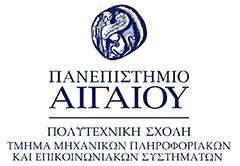Εκπαίδευση - Σπουδές
Πτυχίο Πληροφορικής Ε.Α.Π.
Μεταπτυχιακό Δίπλωμα Ειδίκευσης στη κατεύθυνση Διοίκηση Πληροφοριακών Συστημάτων (MIS) του τμήματος Μηχανικών Πληροφοριακών και Επικοινωνιακών Συστημάτων του Πανεπιστημίου Αιγαίου.
Διδακτορικό Δίπλωμα στην περιοχή της Πληροφοριακής Ιδιωτικότητας, Τμήμα Μηχανικών Πληροφοριακών και Επικοινωνιακών Συστημάτων, Πανεπιστήμιο Αιγαίου.
Μεταδιδακτορικός Ερευνητής στο Τμήμα Μηχανικών Πληροφοριακών και Επικοινωνιακών Συστημάτων του Πανεπιστημίου Αιγαίου,όπου συνεργάζεται ερευνητικά πρωτίστως με τον Καθηγητή Σπύρο Κοκολάκη.
Πιστοποιήσεις:
- "Εργαστήριο Ψηφιακών Συστημάτων" της Σχολής Θετικών Επιστημών του ΕΑΠ
- "U.Lab: Transforming Business, Society, and Self", ΜΙΤx
- SciWrite-SP Writing in the Sciences-Stanford University, School of Medicine
- "Intoduction to Marketing",The Wharton School University of Pennsylvania
- Developing Innovative Ideas for New Companies: The First Step in Entrepreneurship by University of Maryland
- Step-by-step guide to reviewing, Elsevier Publishing Campus
Ερευνητικά Ενδιαφέροντα
- Πληροφοριακή ιδιωτικότητα
- Συμπεριφορική ασφάλεια και ιδιωτικότητα
- Ανωνυμία
- means - end ανάλυση
- Εργαλεία Ενισχυσης Ιδιωτικότητας
- Ανθρωποκεντρική προσέγγιση ιδιωτικότητας και ασφάλειας Π.Σ
Διδασκαλία
Δημοσιεύσεις σε Διεθνή Περιοδικά (Journals)
Copyright Notice: This material is presented to ensure timely dissemination of scholarly and technical work. Copyright and all rights therein are retained by authors or by other copyright holders. All persons copying this information are expected to adhere to the terms and constraints invoked by each author's copyright. In most cases, these works may not be reposted or mass reproduced without the explicit permission of the copyright holder.
Abstract
Search engines, the most popular online services, are associated with several concerns. Users are concerned about unauthorized processing of their personal data, as well as about search engines keeping track of their search preferences. Various search engines have been introduced to address these concerns, claiming that they protect users’ privacy. We call these search engines Privacy-Preserving Search Engines (PPSEs). In this paper, we investigate the factors that motivate search engine users to use PPSEs. To this aim, we adopted Protection Motivation Theory (PMT) and associated its constructs with subjective norms to build a comprehensive research model. We tested our research model using survey data from 830 search engine users worldwide. Our results confirm the interpretive power of PMT in privacy-related decision making and show that users are more inclined to take protective measures when they consider that data abuse is a more severe risk and that they are more vulnerable to data abuse. Furthermore, our results highlight the importance of subjective norms in predicting and determining PPSE use. Since subjective norms refer to perceived social influences from important others to engage or refrain from protective behavior, we reveal that the recommendation from people that users consider important motivates them to take protective measures and use PPSE.
Abstract
Smartphone user authentication based on passwords, PINs, and touch patterns raises several security concerns. Behavioral Biometrics Continuous Authentication (BBCA) technologies provide a promising solution which can increase smartphone security and mitigate users’ concerns. Until now, research in BBCA technologies has mainly focused on developing novel behavioral biometrics continuous authentication systems and their technical characteristics, overlooking users’ attitudes towards BBCA. To address this gap, we conducted a study grounded on a model that integrates users’ privacy concerns, trust in technology, and innovativeness with Protection Motivation Theory. A cross-sectional survey among 778 smartphone users was conducted via Amazon Mechanical Turk (MTurk) to explore the factors which can predict users’ intention to use BBCA technologies. Our findings demonstrate that privacy concerns towards intention to use BBCA technology have a significant impact on all components of PMT. Further to this, another important construct we identified that affects the usage intention of BBCA technology is innovativeness. Our findings posit the view that reliability and trustworthiness of security technologies, such as BBCA are important for users. Together, these results highlighted the importance of addressing users’ perceptions regarding BBCA technology.
Επιστημονικά Συνέδρια (Conferences)
Copyright Notice: This material is presented to ensure timely dissemination of scholarly and technical work. Copyright and all rights therein are retained by authors or by other copyright holders. All persons copying this information are expected to adhere to the terms and constraints invoked by each author's copyright. In most cases, these works may not be reposted or mass reproduced without the explicit permission of the copyright holder.
Abstract
This study examines the relationship between user behavior and exposure to information about Privacy-Preserving Search Engines (PPSEs). The research explores whether exposure to positive, neutral, or negative information about privacy practices affects user behavior toward PPSEs. Results show an increase in PPSE awareness post-exposure but no substantial change in usage. Negative news impacts trust, while positive news enhances usability perception. These findings highlight the need for multifaceted strategies to address privacy concerns and promote PPSE adoption.
Abstract
Session authentication schemes establish the identity of the user only at the beginning of the session, so they are vulnerable to attacks that tamper with communications after the establishment of the authenticated session. Moreover, smartphones themselves are used as authentication means, especially in two-factor authentication schemes, which are often required by several services. Whether the smartphone is in the hands of the legitimate user constitutes a great concern, and correspondingly whether the legitimate user is the one who uses the services. In response to these concerns, Behavioral Biometrics (BB) Continuous Authentication (CA) technologies have been proposed on a large corpus of literature. This paper presents a research on the development and validation of a BBCA system (named BioPrivacy), that is based on the user’s keystroke dynamics, using a Multi-Layer Perceptron (MLP). Also, we introduce a new behavioral biometrics collection tool, and we propose a methodology for the selection of an appropriate set of behavioral biometrics. Our system achieved 97.18% Accuracy, 0.02% Equal Error Rate (EER), 97.2% True Acceptance Rate (TAR) and 0.02% False Acceptance Rate (FAR).
Βιβλία
Copyright Notice: This material is presented to ensure timely dissemination of scholarly and technical work. Copyright and all rights therein are retained by authors or by other copyright holders. All persons copying this information are expected to adhere to the terms and constraints invoked by each author's copyright. In most cases, these works may not be reposted or mass reproduced without the explicit permission of the copyright holder.
Κεφάλαια σε Βιβλία
Copyright Notice: This material is presented to ensure timely dissemination of scholarly and technical work. Copyright and all rights therein are retained by authors or by other copyright holders. All persons copying this information are expected to adhere to the terms and constraints invoked by each author's copyright. In most cases, these works may not be reposted or mass reproduced without the explicit permission of the copyright holder.
Επιμέλεια Πρακτικών Διεθνών Συνεδρίων
Copyright Notice: This material is presented to ensure timely dissemination of scholarly and technical work. Copyright and all rights therein are retained by authors or by other copyright holders. All persons copying this information are expected to adhere to the terms and constraints invoked by each author's copyright. In most cases, these works may not be reposted or mass reproduced without the explicit permission of the copyright holder.





 Download
Download